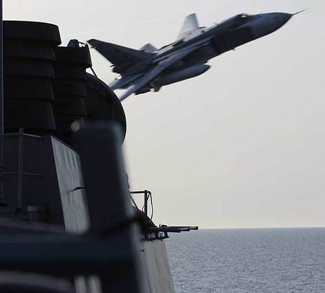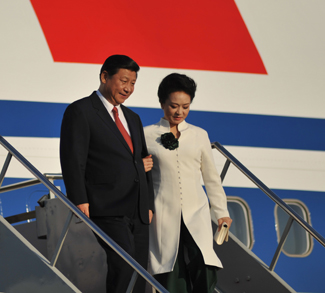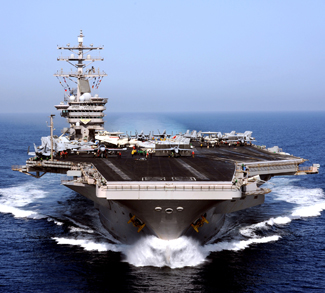With the end of the Cold War twenty-five years ago, many in the U.S have taken the country’s continued global hegemony for granted. However, this state of affairs is increasingly being challenged by both Russia and China, exemplified by their aerial flybys and interceptions of the US military within their respective regions.
Moscow is the Heart
“If St. Petersburg is Russia’s head, and Kiev its legs, then Moscow is its heart.” These words were spoken by Napoleon when explaining the need for France to capture Moscow in order to bring the entire Russian Empire into submission. More generally, he was commenting on the necessity of defeating Russia, first and foremost, in order to truly secure French dominion within Europe.
Recently, a Russian warplane “buzzed” the USS Donald Cook while the ship was performing maneuvers in the Baltic Sea. This incident occurred as the U.S. is looking to increase its material presence in eastern Europe in order to reassure nervous NATO allies in the wake of the Ukraine Crisis. As US-Russian relations continue to deteriorate, the U.S. will most likely face increasing pressure from NATO allies, most notably Poland and the Baltic states, to adopt an even harsher stance towards Russia.
‘She Will Shake the World’
“Let China sleep, for when the Dragon awakes, she will shake the world.” These words were also supposedly spoken by Napoleon and reference his belief that China’s eventual ascension will impact not only Europe, but the entire world. Even in Napoleon’s own time, before the eventual onset of the Opium Wars, this was self-evident.
China, meanwhile, has recently intercepted a US reconnaissance aircraft operating in the South China Sea. Although its relations with the U.S. are not nearly as hostile as US-Russia relations, China has come under increasing international criticism for its artificial island construction and overall territorial claims in the region with respect to its neighbors.
Unsafe and Unprofessional
These incidents, whether in the Baltic or South China Sea, have invariably been labelled by the U.S as either “unsafe” or “unprofessional.” What is conveniently glossed over, however, is the sheer hypocrisy of such statements. Any state, especially a great power, should fully be expected to take such action as its primary responsibility is to protect its territory (and airspace) from any incursions, actual or probable. Even if such incidents do technically occur in international waters and/or airspace, this will do nothing to lessen Russian and Chinese suspicions with respect to the geopolitical motives of the United States.
The case of China, in particular, is interesting in this regard. In the aftermath of the EP3 incident fifteen years ago, there was huge disagreement over whether the U.S. should apologize at all for the death of the Chinese pilot involved. Even if it did, what would an apology specifically entail? Fast forward from this incident to China’s East China Sea Air Defense Identification Zone (ADIZ) declaration. Could this really have come as a shock to any observer?
Just as China learned from the overwhelming, technological success of the U.S. in the Gulf War, as well as the arrival of two U.S. aircraft carrier battle groups during the 1996 Taiwan Strait Crisis, it learned from the EP3 incident. Primarily, it learned how relatively backward its land war-focused military was and that if it had any hope of keeping potential competitors at bay, it would need to focus more on anti-access/aerial-denial (A2/AD) technology focused on sea and air applications.
As a consequence, today the U.S. may be willing to send one or two ships in “Freedom of Navigation” (FONOPS) maneuvers near islands in the South China Sea. However, it clearly will not risk sending one entire aircraft carrier group, much less two, within range of China’s multitude of missiles which lay directly across the strait from Taiwan.
Exceptionalism and Boldness
The U.S. has always thought of itself as being exceptional, exemplified by the “City on a hill” image and lore. This hubris has grown exponentially large since the end of the Cold War and the subsequent “victory” over the Soviet Union. This myopia serves to cloud the U.S.’s judgment when it comes to its own boldness and resolve, compared to other states in the international system.
Whenever the U.S. considered militarily withdrawing from countries in the past, like Iraq and Afghanistan, it was said to have been potentially “emboldening” the enemy. No doubt, this sentiment is indeed a legacy of the Vietnam War. However, the implication is that US interests will continue to be served as long as the U.S. is the only bold state, while everyone else in the world remains flaccid.
Even if one accepts this argument in relation to smaller, weaker states, it is entirely unrealistic, bordering on the point of being delusional, to expect other great powers to accept such flaccidity and impotence. When it comes to potentially infringing upon another great power’s core interest, such as territory, and sphere of influence, it would be mature of the U.S. to expect to encounter strength, not weakness.
If any state today dared to militarily interfere anywhere in Central or South America, can the US response be in doubt? From the original 1823 Monroe Doctrine declaration through the Pinochet coup in Chile to Reagan actions in Grenada to George H.W. Bush actions in Panama, the expectation of U.S. suzerainty within its own hemisphere is clearly understood by all parties.
The U.K. was spared this with respect to the 1982 Falkland Islands War, and then only due to its “special relation” with the United States. However, this is the rare exception, not the rule.
History has proven that no particular state’s hegemony is eternal. Just as facing concerted military opponents on the field of battle, like Napoleon at Waterloo, can bring an end to a hegemon’s reign, so too can internal factors. In today’s world, in which ideas move across continents literally at the speed of light, the U.S has a harsh decision to make. Either it can realize that the world is inevitably moving towards multipolarity, and help devise a new international security architecture which recognizes other states’ legitimate core interests.
Conversely, it can continue down the path of hubris, stupidity, arrogance, and myopia it is currently on, and then deal with a changed world when its strength is inevitably depleted.
The opinions, beliefs, and viewpoints expressed by the authors are theirs alone and don’t reflect any official position of Geopoliticalmonitor.com.




